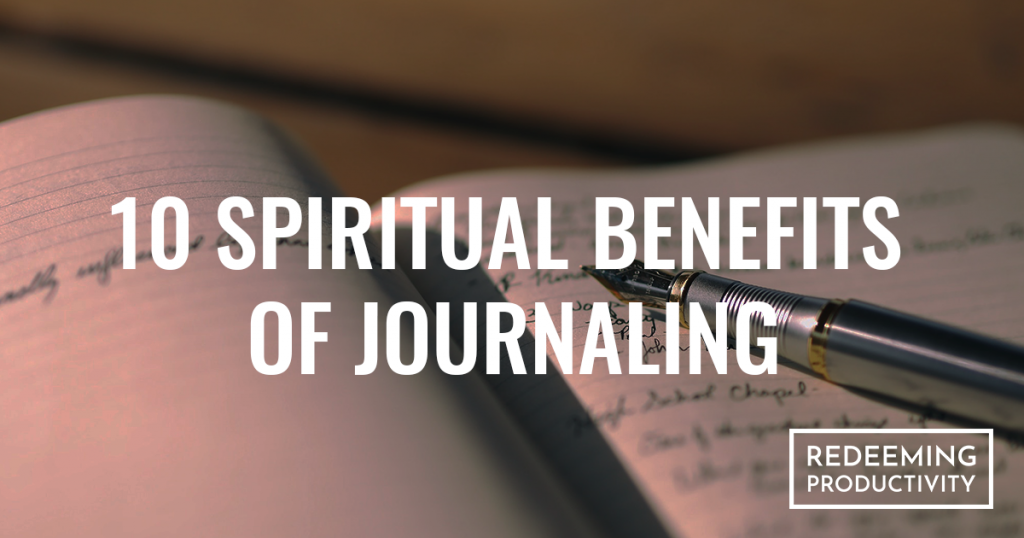
A few weeks ago I was cleaning my garage and discovered a stack of old journals in a plastic bin. That put a prompt end to my cleaning plans. For two-hours, I sat on a metal folding chair poring over entries I had penned over a decade ago. As I read, I was reminded of long-forgotten life events, surprised by God’s providence, and embarrassed by my own ignorance. But for all the emotions those old journals stirred up, when I finally set them down, the one feeling I was left with was gratitude.
I am so glad I have kept a journal since my youth.
There are many blessings to be gained from the simple act of jotting down one’s thoughts each day. I thought about the ways in which journaling has benefitted me spiritually and so, in the hopes of inspiring you to begin journaling or encourage you to keep going, I here offer 10 spiritual benefits of journaling.
1 – Journaling Creates a Record for Yourself
The six-month period of my life which those garage journals covered was notable in several ways. It was a time when I was first entertaining the call to ministry. I had also just begun dating the woman who would later become my wife. And there were numerous other dramatic life-changing events which also were happening in that same span of time. And while I vaguely remembered the outlines of those memories, seeing the details spelled out in my journal illuminated the dark corners of recollection, and restored the colors which had faded with time.
Having a record for yourself to look back on is probably the most obvious benefit to journaling, but the memories you preserve by journaling aren’t just for your sake.
2 – Journaling Creates a Record for Posterity
The memories you stash in your journal can also serve as a record of your thoughts for your posterity. And if by some odd chance you manage to do something important with your life, your journal may be read by more than just curious kin. Keeping a journal is an opportunity to leave a unique legacy—your mind transposed to paper. This is a benefit of journaling I have experienced personally.
My father died when I was just five years old. And my memories of him are few and incomplete. So, when I became a teenager and set out on the hunt of self-discovery those years often prompt, it was important to me to learn more about the man from whose loins I sprung. Thankfully, like myself, my father was an avid journal-keeper. Sitting in the basement, as a young man, working my way through boxes of my dad’s journals was foundational to my coming of age. It gave me insight into my father’s mind, thoughts which would have otherwise been lost forever to the grave. Though dead, he still spoke. And I benefited.

Similarly, reading the journals of believers from the past makes timelessness to us the minds of home-gone saints. Consider the countless missionaries inspired by The Diary of David Brainerd. Similarly, I was recently reading The Life and Diary of Andrew Bonar and was struck by an entry which Bonar penned while he was struggling with the assurance salvation. In the midst of that personal trial he remarks, “Perhaps God has in view others whom, in future years, He may use me to benefit by all this darkness and perplexity.” And so many a struggling saint has benefitted thereby.
What a gift to converse with believers who have long ago passed on to glory. May we leave a similar record of encouragement for those who come after us.
3 – Journaling Creates a Record of God’s Providence
Back in my garage, as I paged through the dusty pages under fluorescent light, I found myself, again and again, uttering thanks to the Lord. With the aid of hindsight afforded me by these journal entries, I was able to perceive more clearly how the Lord was working in even the most confusing times of my young life.
Those entries in which I had expressed the most consternation and agony now appeared to me as “stones of remembrance,” signs of how the Lord had been faithful to see me through even the darkest valleys. And these records of providence are an invaluable resource in times of present trial. They do not supersede the Scriptural testimony to the Lord’s faithfulness but affirm it by being fixed and personal proof of the steadfast love of the Lord toward us. By reading your own journal’s record of God’s providence in the past you can be emboldened to believe that He will yet again be faithful to you in the future.
4 – Journaling Makes You a Clearer Thinker
Even for all that journals do to serve as record keepers of my life, it’s really the benefits I experience in the present from journaling that keeps the habit alive. The foremost immediate spiritual benefit I get from daily journaling is that it makes me a clearer thinker.
Writing, like speaking, is the act of forming thoughts into communicable material—something suitable to be interpreted by another mind. The process makes you burn off the dross half-formed thoughts and clarify opaque reasoning. Turning thoughts into words clarifies your thinking. And thus daily journaling serves those ends, as well.
5 – Journaling is a Foundational Habit Upon Which Other Habits May Be Built
Daily journaling is a discipline, so it is not surprising that many disciplined men and women also tend to be journalers. The funny thing about habits is that they have a tendency to travel in packs. I noted this in a previous article about the habit of daily Bible reading. Getting one habit in place often leads to other habits following suit. Somewhere along the line journaling, prayer, and Bible study became the bedfellows of my morning coffee, and the start of one of those activities acts like a trumpet blast, calling the rest of them to rise and line-up for duty.
6 – Journaling Provides a Means of Unburdening Your Mind
Many mornings I wake up with my mind in a muddle. This lack of concentration has more than once led to an unprofitable time in the Word of God. My mind just keeps wandering away from the text and back to some discussion from yesterday, or some big decision I have coming up.
On these mornings, I have discovered that the best thing for me to do is to set my Bible aside for a few moments and “upload” my mind’s burdens to my journal. Even if I only jot down a few lines, to be returned to later, this seems to do the trick. My bandwidth is freed up, as it were, for reading the Scriptures with greater attentiveness.
7 – Journaling Helps in Making Tough Decisions
Recently, I was faced with a weighty life decision. And if you were to turn in my journal to weeks and months during which I was weighing my options (don’t, please. That’s private), you would find pages of notes of me talking through pros and cons, outcomes and consequences, ambitions and fears. And as I noted in point 1, paper has a way of bringing clarity to thought. So, journaling can bring that clarity to decision-making as well.
8 – Journaling Makes You a Better Writer
It’s common sense that if you want to get better at something, you need to practice it. And while you might not consider yourself a writer, we are all writers—we all write emails, social media posts, and texts. And don’t you want to become better at that writing so that you can communicate more effectively and impress people with your massive vocabulary?
It follows, therefore, that if you want to get better at writing, you need to write more. And a great way to write a little each day is by keeping a journal. The great thing about practicing your writing through journaling is that no one has to see your mistakes. Think of your journal like a private basketball court where you can try out new ways of shooting free-throws without anyone mocking your poor form and definitionless calves.
9 – Journaling Puts Prayer to Paper
Just as a lack of focus in Bible study can be helped by journaling, so too a struggle to concentrate while praying may be assisted by the act of writing your prayers out in a journal.
I remember one day while writing in my journal asking myself, “who am I writing this journal to?” In other words, who is my audience? I wasn’t addressing entries to my journal. Because, contrary to what you may have heard, my journal entries do not all begin with, “dear diary,” (nor does my journal have a lock and heart-shaped key). When I considered the matter, I realized that most of my journal entries had God as their implied addressee. The whole time I had been journaling, I had really been praying. And that’s a practice I have since tried to cultivate more deliberately and which I heartily recommend to you. Journal your prayers.

10 – Journaling Provides a Place to Record Insights Gained from Studying Scripture
Since I usually journal in conjunction with studying the Bible, thoughts concerning the Scriptures I am reading frequently color my entries. But, as is the nature of sinful man, I tend to forget the lessons the Lord has shown me and need reminding. And it is not an infrequent occurrence that I mutter the word “wow” when, in reading old journals, I stumble across some profound insight into a passage which I had long forgotten, written in my own hand. If not for my journal, those insights would not have been preserved for me.
Conclusion
It is my prayer that some of these spiritual benefits of journaling will spark the desire in you to begin keeping a journal or encourage you to persist in the habit.


This is great! I struggle a lot with journaling. Mainly, I get bogged down in the details of it and tend to go overboard in writing. Any ideas on how to get started and keep it simple? Thanks!
I know what you mean with going overboard. I just tell myself that all I need to do is write one sentence for an entry. Often it ends up being more, but many entries are just along the lines of, “Had coffee with Jack. Interesting conversation. Thankful for a new friendship.” Also, reading published diaries (I mentioned David Brainerd and Andrew Bonar) kind of gave me the confidence to keep it short. Bonar especially is very terse in most of his entries.
I found this on a Challies link. I could have written it myself! I’m thinking, who is this guy? When I get to the bottom I read, “Slave of Christ” Whaaat? Did I write this post? Then I see Grace to You and Master’s Seminary. Of course! Maybe I’ll get to meet you at the Truth Matters Conference.
All this to say, I recently scanned all my old journals as a back up. It can be time consuming, but it’s worth it :)
Sounds like we are birds of a feather, Susan! Yes, I’ll be at the conference, too. I will probably spend a lot of time at the GTY booth so please stop by and say hello.
Reagan, Great article, I am going to life part of this for an article (accredited of course) that I am working on.
Thanks, John!
Well done, Reagan Rose!
I ‘d like to share of few of your suggestions soon (fully accredited), at a Women’s mentoring group discussion about Journaling. Thanks for sharing and offering your insight. Blessings!
Be my guest! Thanks, Carole!
First time reading your post.It is enlightening.I want to learn and start journaling this year